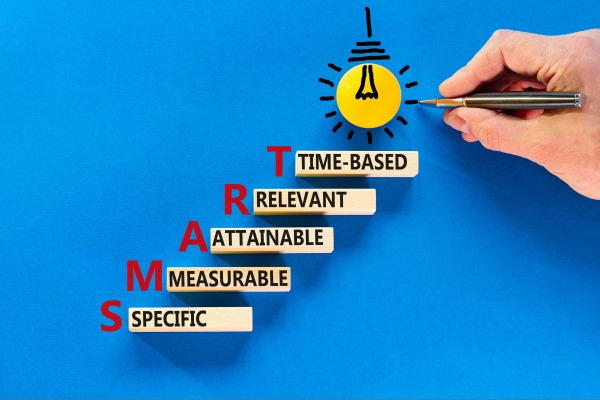How to Set SMART Goals for Success

Are you ready to transform your goal-setting game? Welcome to the world of SMART goals – a powerful framework that can help you achieve your wildest dreams! In this blog post, I’ll dive deep into the SMART goal-setting process, share real-life examples, and provide helpful tips to supercharge your success. Get ready to unlock your full potential and embark on an exciting journey to a more focused and fulfilling life.
Short Summary
- Set SMART goals to stay motivated and focused on achieving success.
- Monitor progress, stay accountable and adjust as needed for successful outcomes.
- Avoid common pitfalls by setting realistic expectations, staying flexible & striking a balance between quantitative/qualitative metrics.
Understanding SMART Goals

When it comes to setting goals, the SMART acronym is your secret weapon for success. SMART goals stand for Specific, Measurable, Achievable, Relevant, and Time-bound – a tried-and-true formula that helps individuals and organizations set clear objectives and track progress to reach their desired outcomes. By following the SMART framework, you can unlock success in various areas of your life, from personal goals to professional achievements and business growth.
But why is the SMART approach so effective? The answer lies in its ability to set realistic, well-defined goals that keep you motivated and focused. By ensuring your goals are specific, measurable, achievable, relevant, and time-bound, you’re more likely to stay on track and achieve desired results.
Specific
A specific goal is crystal clear, leaving no room for misinterpretation or ambiguity. In the SMART framework, specificity is key to ensuring everyone is on the same page and knows exactly what needs to be achieved.
For instance, instead of merely stating that you want to “save money,” a specific goal would be to “save $5,000 in the next six months for a down payment on a house.” Clearly defining your objective eliminates confusion and sets a solid foundation for success.
Measurable
Measurable goals are essential for tracking progress and ensuring success. Setting quantifiable objectives allows you to easily monitor your progress, celebrate your achievements, and identify improvement areas.
For example, if your goal is to grow your blog’s audience, a measurable goal would be to “increase monthly visitors from 5,000 to 10,000 by the end of the year.” With a measurable goal, you can clearly see the finish line and stay motivated to reach it.
Achievable
Setting challenging but achievable goals is crucial for maintaining motivation and enthusiasm to reach them. While it’s important to aim high, ensuring your goals are realistic is essential, given your available resources, time, and effort.
To set ambitious yet achievable goals, create a list envisioning the most incredible outcomes, take a breather, and then refine your list with critiques and challenges to find the right balance.
Relevant
A relevant goal aligns with your overall mission and considers the current trends in your industry. Review your company’s mission and vision statements to ensure your goal is relevant and consider the broader business context. By setting relevant goals, you can better focus your efforts and resources on achieving success in your industry.
For instance, if you’re a marketing professional, an inspiring and relevant goal might be to “increase social media engagement by 20% in the next quarter to boost brand awareness and drive sales.”
Time-bound
A time-bound goal has a definite timeline for completion, which creates a sense of urgency and sets clear expectations for stakeholders. By establishing a target date, you can stay motivated and better manage your time and resources to achieve your goal.
For example, if your goal is to launch a new product, setting a time frame such as “within the next three months” helps keep you and your team focused and accountable.
Crafting Your Own SMART Goals

Now that you understand the SMART framework, it’s time to craft your own SMART goals! The process involves three simple steps: identify your objective, break it down into smaller chunks, and apply the SMART framework. Setting a clear objective and breaking it down into achievable steps can create a roadmap for success that keeps you motivated and on track.
Your goals should be SMART – Specific, Measurable, Achievable, Relevant and Time-bound. This will help you keep track of your progress and achieve the desired outcomes. This ensures that your goals are clearly defined, attainable, and focused on the right objectives, helping you stay inspired and energized to reach your ultimate goal.
Identify Your Objective
You need to identify your objective before you can craft your own SMART goals. What do you want to achieve? This is your starting point, the foundation upon which you’ll build your SMART goals. Whether it’s a personal goal like losing weight or a professional goal like increasing your sales, having a clear objective is crucial for success.
Don’t be afraid to dream big – the SMART framework will help you break down your goals into manageable steps, making even the most ambitious goals achievable.
Break It Down
Once you’ve identified your objective, the next step is to break it down into smaller, more manageable tasks or sub-goals. This makes your goal less overwhelming and easier to achieve, helping you stay focused and motivated.
For example, suppose your goal is to increase your company’s revenue by 20% in the next year. In that case, you might break it down into tasks like improving product quality, expanding your customer base, and launching new marketing campaigns. You’ll create a clear roadmap to success by breaking down your goal.
Apply the SMART Framework
Finally, apply the SMART framework to your goal, ensuring it’s specific, measurable, achievable, relevant, and time-bound. For example, if your goal is to learn a new language, a SMART goal would be to “be conversational in Spanish within six months by practicing for 30 minutes daily and attending weekly conversation classes.”
By applying the SMART framework, you’ll set yourself up for success and be well on your way to achieving your most ambitious goals.
🌟Book Your FREE Coaching Session Now🌟
Or call
604 998 3430
Let’s work together to create a clear roadmap for your business journey, paving the way for growth, productivity, and lasting success. The time is now – don’t let your goals slip away.
Remember: Success is where preparation and opportunity meet.
Real-Life SMART Goal Examples

To help you see the power of SMART goals in action, let’s explore some real-life smart goals examples in personal, professional, and business settings. These examples demonstrate how the SMART framework can be applied to many goals, providing a clear roadmap to success and helping you stay motivated throughout your journey.
Understand the capabilities and set realistic goals. A SMART goal is the best way to achieve this. It should be specific, measurable, achievable, relevant and time-bound. By crafting measurable smart goals that meet these criteria, you’ll be better equipped to tackle your objectives and achieve your dreams.
Personal Goal Example

Let’s say your personal goal is to improve your fitness. A SMART goal for this objective could be to “complete a 10K race in under 60 minutes within the next six months by following a structured training plan and increasing weekly mileage.”
This goal is specific (completing the race in a certain time), measurable (you can track your race time), achievable (assuming you have a baseline level of fitness), relevant (it aligns with your fitness goal), and time-bound (you have six months to achieve it).
Professional Goal Example

In a professional setting, a SMART goal could be to “write management’s goals to earn a promotion to a managerial position within the next year by consistently exceeding performance targets, completing a leadership development program, and actively seeking feedback from supervisors.”
This achievable goal is specific (earning a promotion), measurable (performance targets and program completion), achievable (assuming you have the necessary skills and experience), relevant (it’s aligned with your career growth), and time-bound (you have a year to achieve it).
Business Goal Example

For a business goal, a SMART example might be to “increase annual revenue by 15% within the next fiscal year by expanding product offerings, targeting new markets, and optimizing sales processes.”
This goal is specific (increasing revenue by a certain percentage), measurable (you can track revenue growth), achievable (assuming sufficient resources are available), relevant (it’s aligned with the company’s growth objectives), and time-bound (you have a fiscal year to achieve it).
Tips for Achieving Your SMART Goals

Now that you’ve crafted your SMART goals, it’s time to implement them! Here are some tips to help you stay on track and achieve success.
Monitor Progress: Regularly assess your progress towards your goal, making adjustments to ensure you stay on course. Tracking your progress not only helps you stay motivated but also allows you to identify potential roadblocks and make necessary changes to your plan.
2. Stay Accountable: Take ownership of your actions and decisions, and hold yourself accountable for the outcomes of your choices. This can help you stay focused and committed to achieving your goals.
3. Adjust as needed: Be flexible and adapt to changing circumstances, adjusting your goals and plans for optimal results. This can help you stay agile and responsive, ensuring your success in the face of uncertainty.
These tips enable you to tackle your SMART goals and achieve your most ambitious dreams.
Monitor Progress

Keeping track of your progress is essential to staying motivated and on track with your goals. Regularly review your progress, adjusting your plan to ensure successful outcomes. By monitoring your progress, you can celebrate your achievements, identify areas that need improvement, and adapt your approach to better suit your current circumstances.
This will help you stay focused and energized on your journey to success.
Stay Accountable
Accountability is key to achieving your goals. By owning your actions and decisions, you can build a strong sense of responsibility and commitment to your objectives. Hold yourself accountable for the outcomes of your choices, and seek feedback from others to help you stay on track and improve your performance.
This will not only help you stay focused on your goals, but also foster a growth mindset and drive your personal and professional development.
Adjust as Needed
Flexibility is crucial when working towards your SMART goals. As circumstances change, it’s important to be adaptable and adjust your goals and plans accordingly. This could mean revising your deadline, reallocating resources, or changing your approach to better suit your current situation.
By staying flexible and adapting to change, you’ll be better equipped to overcome obstacles and achieve your goals, no matter the challenges.
Common SMART Goal Pitfalls and How to Avoid Them
While SMART goals are a powerful framework for success, they can also have potential pitfalls. By being aware of these common challenges and avoiding them, you can increase your chances of success and make your smart goal-setting journey as smooth as possible. One way to ensure this is to write smart goals to help you stay focused and on track.
Here are three common SMART goal pitfalls and how to avoid them.
1. Unrealistic Expectations: Setting too ambitious goals can lead to disappointment and frustration if they’re not achievable. To avoid this pitfall, ensure your goals are challenging but realistic, taking into account your available resources, time, and effort.
2. Lack of Flexibility: Being inflexible can prevent you from taking advantage of new opportunities and adapting to changing circumstances. To stay agile and responsive, be open to change and adjust your goals as needed. Focusing too much on metrics can cause you to lose sight of the bigger picture and neglect other important aspects of your goals. Consider quantitative and qualitative factors when setting and evaluating your goals to strike the right balance.
Unrealistic Expectations

Setting unrealistic expectations can lead to feelings of anxiety, disappointment, stress, and even depression if not addressed. To avoid this pitfall, ensure your goals are achievable and realistic, given your available resources, time, and effort.
Remember, the purpose of setting goals is to help you stay focused and motivated, so it’s important to set yourself up for success by choosing both challenging and attainable goals.
Lack of Flexibility
Being inflexible can prevent you from taking advantage of great opportunities, lower productivity, and increase stress levels. To avoid this pitfall, stay open to change and be willing to adjust your goals and plans as needed.
This will help you stay agile and responsive in the face of uncertainty and enable you to make the most of new opportunities as they arise.
Overemphasis on Metrics
Focusing too much on metrics can cause you to lose sight of the bigger picture and make decisions that are not in the best interest of your project or goal. To avoid this pitfall, strike the right balance by considering quantitative and qualitative factors when setting and evaluating your goals.
This will help you maintain a holistic view of your progress and ensure you’re making the best decisions for your overall success.
Summary
In conclusion, SMART goals are a powerful tool for success in all areas of your life. Setting specific, measurable, achievable, relevant, and time-bound goals allows you to stay focused, motivated, and on track to reach your most ambitious dreams. With real-life examples, tips for achieving your SMART goals, and strategies for avoiding common pitfalls, you can confidently embark on your goal-setting journey. So go ahead, dream big, and set your sights on the stars – the world is waiting for you!
Frequently Asked Questions

What are the 5 SMART goals?
You can create effective strategies for achieving your desired outcomes with SMART goals. By following these five objectives—being Specific, Measurable, Achievable, Relevant, and Time-Bound—you can set clear goals that are focused and achievable.
In short, the 5 SMART goals are specific, measurable, achievable, relevant, and time-bound objectives.
How can I write my SMART goals?
To write my SMART goals, I need to be specific about what I want to accomplish, create measurable criteria to track progress, ensure that my goals are achievable, and ensure they are realistic and have a timeline for completion.
Additionally, I should use motivating language and keep myself motivated to reach my goals.
What are SMART goals for your life?
Setting SMART goals is an effective way to create a clear vision and plan for success. By defining these goals in terms of being Specific, Measurable, Attainable, Relevant, and Time-Bound, you can stay motivated and focused on achieving the best possible outcome for your life.
How do you set SMART goals with 5 examples?
Setting SMART goals is an effective way to improve performance and increase the chance of success. To set SMART goals, you must be Specific, Measurable, Attainable, Relevant, and Time-bound.
Examples of SMART goals include increasing sales by a certain amount, reducing customer service complaints, hitting a certain market share, improving customer satisfaction, and reducing overall costs.
What is the SMART acronym?
SMART is an effective system for setting goals that stand for Specific, Measurable, Achievable, Relevant, and Time-bound. This structure encourages strategic planning, allowing you to focus on what matters and achieve success with greater ease.
🎯**Are you ready to transform your dreams into reality with SMART goals?**🎯
As a dedicated Business Coach, I’m here to guide you every step of the way and help you set achievable, results-driven goals. Don’t miss this opportunity to elevate your business to new heights!
✨**Take action now! Schedule a FREE 30-minute coaching session with me today to explore how SMART goals can revolutionize your business success.**✨
🌟Book Your FREE Coaching Session Now🌟
Or call
604 998 3430
Let’s work together to create a clear roadmap for your business journey, paving the way for growth, productivity, and lasting success. The time is now – don’t let your goals slip away.
Remember: Success is where preparation and opportunity meet.



